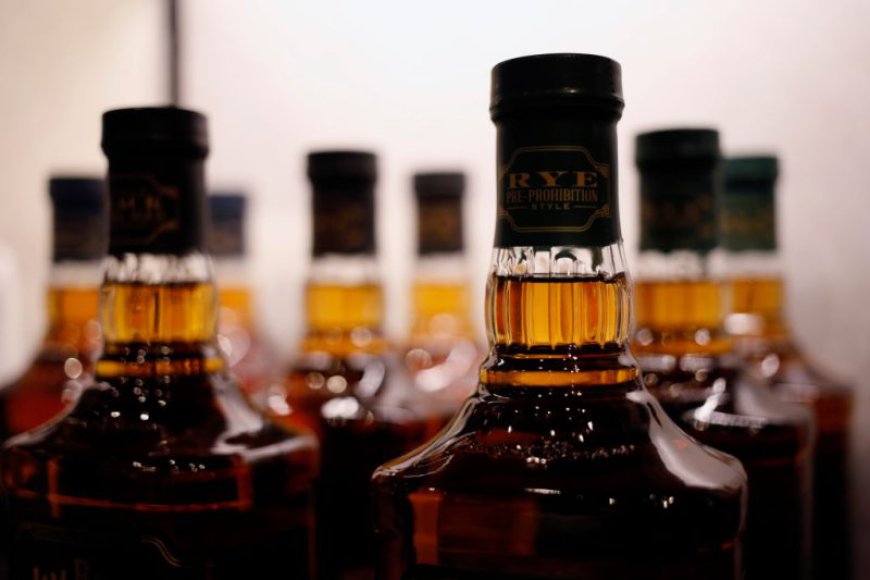Ohio bill would require high-demand liquor bottles to be opened when sold
The bill aims to combat "flippers" who quickly buy up the limited supply of highly sought-after spirits in Ohio to illegally resell them on a secondary market for significantly more than what they paid.

COLUMBUS, Ohio (WCMH) – A bill recently introduced in Ohio hopes to combat an illegal secondary market for high-demand liquor.
Sen. Bill DeMora (D-Columbus) is a fan of bourbon and seeks out rare bottles. Ohio's state liquor agency sends out a notice when a limited supply of these highly sought-after bourbons, whiskies and other spirits such as tequila are made available for purchase at certain stores. DeMora and others then wait in line for the chance to get a bottle.
“I'm just trying to look out for all the regular bourbon-lovers like myself,” DeMora said. “When I get notices of the bourbon I want, I stand in line. I've been successful twice. I've been unsuccessful a dozen times.”
The problem, DeMora said, is that people who he refers to as “flippers” quickly buy up the allocated bourbons and illegally resell them on a secondary market for significantly more than what they paid.
“If they buy a bottle of Pappy Van Winkle (a brand of bourbon) for $165, they turn around and sell it for $2,000 on the internet with these various sites and that is illegal and what it does is it basically stops people that are bourbon drinkers that want the bourbon for themselves, they can't get them,” DeMora said.
That is why DeMora introduced Senate Bill 320 in October. The bill would require liquor stores to open the high-demand bottle and reseal it upon a sale, which in most instances would involve removing any plastic and a cork, then putting a sticker on the cork and placing it back in the bottle. He believes this would help put an end to the secondary market, by reducing resellers’ demand.
“If someone's charging you $2,000 for a bottle of bourbon and it's already been opened, unless you know that person very well, you're not going to buy that bourbon because you don’t know what's in it,” DeMora said. “Because once the seal is off, someone can put some or all of it in cheaper stuff and you have no idea what's actually in there.”
In Ohio, liquor prices are fixed – meaning the same bottle costs the same price no matter where it is purchased – and reselling alcohol outside of the state's system is illegal. Fines and jail time are possible punishments for those who resell spirits.
“The state loses sales tax and income tax because people are flipping these things and don't report that income that they get from flipping it because it's illegal activity,” DeMora said.
The popularity of high-priced, specialty bourbons has significantly increased in recent years. In 2023, the revenue brought in by high-end bourbons increased by 274% compared to 10 years prior, according to the Distilled Spirits Council of the United States.
Keeping up with the growing demand can be a challenge, since bourbon is aged in new white oak barrels – typically for at least two years – before it is bottled. Pappy Van Winkle, one example DeMora gave of an allocated bourbon, is aged 10 to 23 years.
“I'm just trying to make it fair for all the people in Ohio who want to drink and enjoy these bourbons, to give them a fair chance and not to have to have a bunch of people who have no desire to drink it themselves flip it and make money,” DeMora said.
The bill was referred to the Agriculture and Natural Resources Committee in November and awaits its first hearing. With this legislative session ending in December, it is unlikely the bill will pass this year.
However, DeMora said if it does not pass, he plans to reintroduce it next year with a few updates. DeMora said he would like to amend the bill to prohibit individuals from buying more than one bottle of a specifically allocated bourbon every 30 days.
He also plans to propose having the state buy electronically sealed storage cases that unlock at randomized times, so liquor store employees do not have insider knowledge on when the bourbons will become available and the opportunity to tell others when to get in line. This would give everyone an equal chance of getting a bottle, DeMora said.
What's Your Reaction?

























